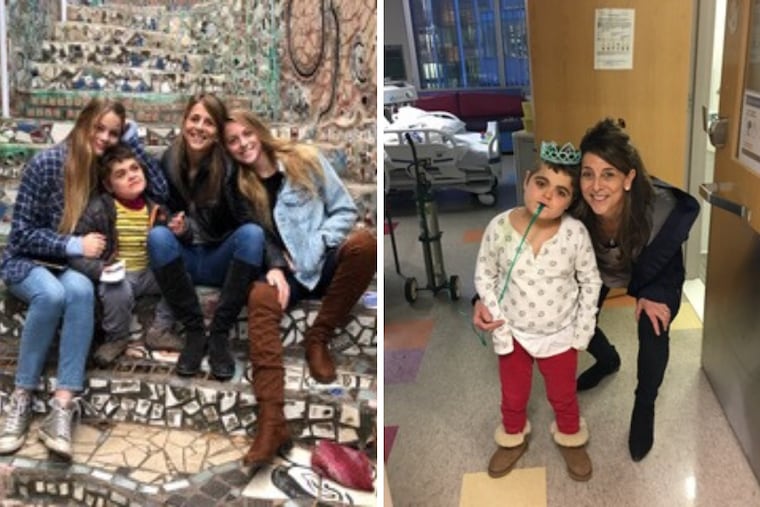‘This virus is a death sentence for my daughter’: How coronavirus guidelines punish disability | Perspective
Should Leta catch this virus, her preexisting lung disease and cognitive challenges make her a highly unlikely candidate for a ventilator because she has a lower chance of survival — and lacks the attributes society deems worth fighting for.

My daughter Leta is one of the strongest people I know. Through 22 years of life, she has endured painful and terrifying respiratory illness, each time overcoming what felt like insurmountable odds with the compassionate support and dedicated care of the emergency room staff at the Children’s Hospital of Philadelphia.
Amid the current outbreak of COVID-19, however, the doctors and nurses who have fought for Leta’s life may be prevented from providing the same equipment and care in a future hour of need. Across the country, according to crisis standards of care being developed, if Leta goes into respiratory distress and needs a ventilator, she may not make the cut.
That’s because Leta has a severe intellectual disability called CHOPS Syndrome. She is nonverbal and has lung disease and pulmonary hypertension. With dozens of trips to the ER for respiratory distress, her life has been a dress rehearsal for this pandemic of 2020. Except that in these unprecedented times, as the virus continues to spread, lifesaving ventilators are increasingly in short supply. That means someone has to decide who lives and who dies. Someone must determine the value of a life.
Disaster preparedness plans in Washington and Alabama say that people with cognitive issues will be a lower priority for lifesaving treatment. As Ari Ne’eman points out in the New York Times, policies like this exist throughout the country. As this pandemic unfolds, choices will likely mimic Italy’s current predicament, where they are sacrificing the medically fragile for the healthy.
A panel of bioethicists on a National Academies of Sciences committee met last week to issue crisis standard of care recommendations. Their report offers a national disaster response framework for treating patients during the COVID-19 crisis that shifts from doing the best for an individual to what can help save the most lives, as our health system rations ventilators and other supplies to deal with the surge of patients.
Many state guidelines are being set up on a point system: Critically ill patients get a score from one to eight, with a higher score meaning you are less likely to get a ventilator. The elderly, patients with conditions like advanced cancer, dementia, or chronic lung diseases, and those with disabilities will score higher and more likely be transferred to palliative care.
» READ MORE: Coronavirus made accessibility a priority. It should stay that way when the pandemic ends. | Opinion
I get it: It is a rare person who sees someone with intellectual disabilities and recognizes them as innately valuable as other, able-bodied individuals. Should Leta catch this virus, her preexisting lung disease and cognitive challenges make her a highly unlikely candidate for a ventilator because not only does she have a lower chance of survival — she does not have the attributes that society deems worth fighting for. In other words, this virus is a death sentence for my daughter.
Leta isn’t alone. More than seven million Americans have developmental or cognitive disabilities. With the exponential rate of increase for coronavirus cases, many of these individuals stand to catch the virus. This community is especially vulnerable to the disease. Under these emergency guidelines, many families with special needs loved ones will carry a similar trajectory of grief.
Deciding who receives lifesaving medical support is not an easy choice. They are tragic choices in any civilized society. But the reality is that we are in a new kind of war, and these triage choices will happen in the next few weeks across our nation. As doctors on the frontline face draconian decisions, the thinking is that guidelines will take the hard decision away from individual medical teams. But as we all move into these more isolated and reflective times, maybe it is fair to ask: “How do you measure a life?” If it is your loved one, despite their “survival rate” or a clinically defined “quality of life” that is passed over for a ventilator, how will you feel?
» HELP US REPORT: Are you a health care worker, medical provider, government worker, patient, frontline worker or other expert? We want to hear from you.
Disability Rights Pennsylvania has filed a federal civil rights complaint alleging that the state’s draft of the medical treatment rationing plan discriminates against people with intellectual disabilities. This virus doesn’t discriminate. Neither should those entrusted with deciding who gets access to health care. The most vulnerable in our society deserve an equal chance.
» READ MORE: Who lives, who dies: Pa., N.J. facing tough priorities as COVID-19 cases mount
Leta is my life. She means the world to her dad, her four siblings, and a host of caretakers and friends who have been changed in the best ways by knowing her. Her life may not matter if viewed through a “transactional” lens. She cannot get a 9-to-5 job, have kids, or run a Fortune 500 company with stock options. But she is deeply important and unconditionally worthwhile.
Our country is not only fighting this virus. We are in a full-on battle for our nation’s soul. The care of my daughter and the millions of Americans with intellectual disabilities reflect our society’s level of empathy and compassion. It defies logic to think that any doctor, nurse, ethical expert, or government bureaucrat is qualified to put a price tag on that.
Lainey Moseley is a mother, freelance news producer for NBC News, and founder of Little Acorn House. She writes about Leta’s journey and her work to champion the rights of people with disabilities on her blog, savingleta.com.